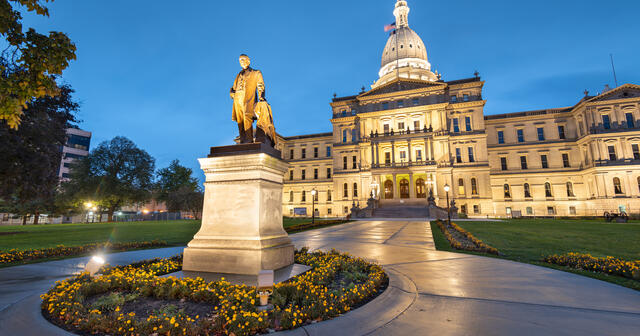
MIDLAND, Mich. — Michigan lawmakers should exercise fiscal restraint and refrain from spending all available revenue, the Mackinac Center for Public Policy advises. The Mackinac Center’s Sustainable Michigan Budget proposal, which limits spending to no more than the growth of the state’s population and inflation, seeks to ensure the state budget doesn’t grow faster than the average taxpayer’s ability to pay for it.
Restraining spending helps safeguard the economic well-being of Michigan residents and fosters long-term economic growth. Unfortunately, lawmakers feel choose to spend all the revenue they have at their disposal. This was evident last year, as Michigan spent nearly $2 billion on district-specific pork projects. Another $4.1 billion went to corporate welfare handouts.
“Michigan has a spending problem, not a tax revenue problem,” said Vance Ginn, Ph.D., senior fellow at the Mackinac Center. “By following the Mackinac Center’s Sustainable Michigan Budget approach, the state can pass a sustainable budget, improve its economic ranking among states, and unleash the potential of people to flourish.”
Prioritizing sustainability can directly impact taxpayers and help the economy. The money the state collects has risen drastically in recent years, but so has the state budget. If lawmakers had kept the past six budgets at sustainable levels, taxpayers would have saved enough to cut the state’s personal income tax in half. This would give a typical household $1,600 more per year.
Gov. Gretchen Whitmer announced spending $46.3 billion in state dollars as part of her budget last month, a 1.5% decrease from last fiscal year. The reduction recognizes that state budget trends are not sustainable, yet the governor’s budget also assumes that the $700 million tax hike will remain in place this year. The Michigan Supreme Court will soon decide whether the tax hike will be permanent. The Mackinac Center is representing business groups, lawmakers, and six taxpayers from across the state in a lawsuit challenging the administration’s unlawful tax hike.
“The state budget has grown more than residents’ ability to pay,” said James Hohman, director of fiscal policy at the Mackinac Center. "The governor is planning to spend every last cent and wants even more. Lawmakers should instead practice restraint.”
Learn more about the Sustainable Michigan Budget proposal here.

The Mackinac Center for Public Policy is a nonprofit research and educational institute that advances the principles of free markets and limited government. Through our research and education programs, we challenge government overreach and advocate for a free-market approach to public policy that frees people to realize their potential and dreams.
Please consider contributing to our work to advance a freer and more prosperous state.

Donate | About | Blog | Pressroom | Publications | Careers | Site Map | Email Signup | Contact